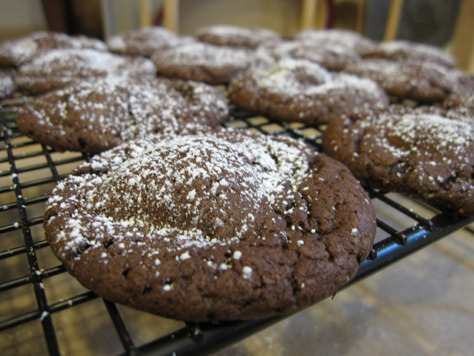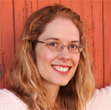Beth Cato's Blog, page 165
June 8, 2012
WIP: the meme of sevens
Here's something fun and different. There's a writing meme going around LiveJournal: "Post your work in progress, page 77 or page 7, lines 7-14, no cheating."
In the case of my current story, tentatively titled, "Judgment Day," there may not be much fun:
In the case of my current story, tentatively titled, "Judgment Day," there may not be much fun:
Her fingers explored, finding cloth. Sheets, blankets. Hers? She reached back along the length of her body, where wetness lingered, and grasped at her left foot.
It was gone.
Published on June 08, 2012 08:31
June 6, 2012
Bready or Not: Civil War Macaroni and Cheese
Nothing says "comfort food" like macaroni and cheese. I mean, come on. It's CHEESE. The food of the gods and the otaku. As a kid, the first two things I learned to cook on my own were Top Ramen, and Kraft Macaroni and Cheese. Of course, as an adult, that blue box from Kraft doesn't cut it anymore. I need real cheese, people. Piles of it.

Pinterest has had a lot of recipes with the one-pot method of cooking macaroni: boil the elbow noodles in milk, not water. A lot of recipes looked good, but being a total history geek, I didn't give the recipe a try until I saw it called Civil War Macaroni and Cheese. I never would have thought of this as a period dish!

A few notes here: this cooked faster than I anticipated. The original recipe said 15 minutes, but I was down to almost no milk and had tender noodles at 10. Watch it.
I also gave it a southwestern tang and added a little can of Hatch green chiles. Remember, you can customize this a hundred different ways! Mix in diced ham, bacon, or shredded beef; add veggies, or different cheeses.

Original recipe and history notes at Simply Recipes.
Civil War Macaroni and Cheese Recipe
Ingredients
4 cups whole milk
1/2 pound elbow macaroni pasta (2 to 2 1/2 cups)
4 Tbsp butter
2 cups, packed, grated cheddar cheese (about 1/2 pound)
4 ounce can Hatch green chiles
Freshly ground black pepper
Nutmeg/dried mustard/seasoning salt/whatever you like
Bread crumbs to top it
Directions
1) Preheat the oven to 400-degrees.
2) Heat the milk in a large saucepan until steamy. Stir in the dry macaroni. Let come to a boil, reduce the heat to a simmer. Stay by the stove! The milk can get very foamy and boil over. Cook the macaroni for 10-15 minutes or until done; the milk will be mostly absorbed.
3) As soon as the macaroni is close to being done, melt the butter in a separate saucepan, and stir in the grated cheese, black pepper, and other seasonings. Once the cheese has melted, pour the sauce into the macaroni and milk mixture and stir to combine. Taste and adjust seasonings as needed.
4) Pour macaroni and cheese mixture into a baking dish. Sprinkle the top with breadcrumbs and/or additional cheese. Bake in a 400°F oven for 20 minutes or until the top is lightly browned.
OM NOM NOM.


Pinterest has had a lot of recipes with the one-pot method of cooking macaroni: boil the elbow noodles in milk, not water. A lot of recipes looked good, but being a total history geek, I didn't give the recipe a try until I saw it called Civil War Macaroni and Cheese. I never would have thought of this as a period dish!

A few notes here: this cooked faster than I anticipated. The original recipe said 15 minutes, but I was down to almost no milk and had tender noodles at 10. Watch it.
I also gave it a southwestern tang and added a little can of Hatch green chiles. Remember, you can customize this a hundred different ways! Mix in diced ham, bacon, or shredded beef; add veggies, or different cheeses.

Original recipe and history notes at Simply Recipes.
Civil War Macaroni and Cheese Recipe
Ingredients
4 cups whole milk
1/2 pound elbow macaroni pasta (2 to 2 1/2 cups)
4 Tbsp butter
2 cups, packed, grated cheddar cheese (about 1/2 pound)
4 ounce can Hatch green chiles
Freshly ground black pepper
Nutmeg/dried mustard/seasoning salt/whatever you like
Bread crumbs to top it
Directions
1) Preheat the oven to 400-degrees.
2) Heat the milk in a large saucepan until steamy. Stir in the dry macaroni. Let come to a boil, reduce the heat to a simmer. Stay by the stove! The milk can get very foamy and boil over. Cook the macaroni for 10-15 minutes or until done; the milk will be mostly absorbed.
3) As soon as the macaroni is close to being done, melt the butter in a separate saucepan, and stir in the grated cheese, black pepper, and other seasonings. Once the cheese has melted, pour the sauce into the macaroni and milk mixture and stir to combine. Taste and adjust seasonings as needed.
4) Pour macaroni and cheese mixture into a baking dish. Sprinkle the top with breadcrumbs and/or additional cheese. Bake in a 400°F oven for 20 minutes or until the top is lightly browned.
OM NOM NOM.

Published on June 06, 2012 06:01
June 3, 2012
Sunday Quote needs to do some P90X chest and back
"A book is proof that humans are capable of working magic." ~ Carl Sagan
Published on June 03, 2012 08:14
June 1, 2012
June, I reject you!
How is it June already? Wasn't it Christmas, like, yesterday? And why is the temperature supposed to be 112 degrees today? That's egg-frying-on-car-hood kinda weather. Yeesh. Why is my son home all day--why does summer break exist? Then there's my email box. Why do I keep getting all these mean, negative emails from editors?
Oh yeah. I'm a writer.
I've noticed that rejections and acceptances tend to run in cycles. You can guess what cycle I'm in right now. It's hard. I often think of it as being a junkie in need of my next fix. I keep submitting, submitting, submitting as I hunger for that acceptance that makes it all worthwhile.
If you're also in the dregs of rejection, you may appreciate 25 Things Writers Should Know About Rejection from the brilliant Chuck Wendig. (NSFW because of profanity.) For me, #25 sums it up beautifully: Rejections Are Proof You've Been to the Thunderdome. Heck yeah. Pardon me while I queue up Tina Turner singing, "We Don't Need Another Hero."
If I had my druthers, I'd reject this hellish heat for the cool and breezy Morro Bay, but since I can't, I'll sit here in my air conditioned hidey hole and send out more submissions.
I need my fix.
Oh yeah. I'm a writer.
I've noticed that rejections and acceptances tend to run in cycles. You can guess what cycle I'm in right now. It's hard. I often think of it as being a junkie in need of my next fix. I keep submitting, submitting, submitting as I hunger for that acceptance that makes it all worthwhile.
If you're also in the dregs of rejection, you may appreciate 25 Things Writers Should Know About Rejection from the brilliant Chuck Wendig. (NSFW because of profanity.) For me, #25 sums it up beautifully: Rejections Are Proof You've Been to the Thunderdome. Heck yeah. Pardon me while I queue up Tina Turner singing, "We Don't Need Another Hero."
If I had my druthers, I'd reject this hellish heat for the cool and breezy Morro Bay, but since I can't, I'll sit here in my air conditioned hidey hole and send out more submissions.
I need my fix.
Published on June 01, 2012 09:12
May 30, 2012
Bready or Not: Rolo Cake Mix Cookies
I wrote today’s post as part of the WOW-Women on Writing’s "Everybody’s Talking About Favorite Childhood Memories" mass-blogging event celebrating the release of Finding Emma by Steena Holmes.
Steena is a woman who believes that 'in the end, all things succumb...to the passions of your heart'. Steena's life revolves around her family, friends and fiction. Add some chocolate into the mix and she's living the good life. She took those passions and made them a dream come true by pouring her heart into each of her stories.
Finding Emma has quickly become a bestseller. Proceeds from each book will be donated to The Missing Children's Society of Canada - an organization dedicated to reuniting families.
If you comment on today’s post on this blog or any of the others participating the "Everybody’s Talking About Favorite Childhood Memories" day, you’ll be entered to win a signed copy of Finding Emma!
To read Steena’s about childhood memories and view a list of other blogs participating in the "Everybody’s Talking About Favorite Childhood Memories" day please visit The Muffin.

Food and memories are so closely entwined. A smell, a texture, a taste--in an instant we can be transported back in time. Therefore, it's pretty easy to tie memories into a Bready or Not post.
If I'm talking about childhood foods and the subject goes to sweets, then I must discuss Rolos.
Rolos were my go-to candy from the time I was about 2. If I was on good behavior in the grocery store, a Rolo or Golden Book would be my reward. I also had restraint that my mom marveled at, as I could eat a couple Rolos and then tuck the rest in the fridge for later. I could make it last for couple of days like that--weird for a kid, I know.
(Though, as my body could attest, that restraint was long gone by the time I was a teenager.)
Today's recipe is super easy. Probably the most time consuming thing is to unwrap and slice Rolos in half. Otherwise, it's a matter of throwing together cake mix and a few other ingredients.
Yeah, I love making stuff from scratch, but I fully admit that cake mixes come in handy. They are cheap and fast and can readily be doctored into tasting homemade. The basis of this recipe is one I have made for years--just use cake mix, 2 eggs, 1/3 cup of oil, and you have cookie dough. It's great with devil's food cake mix (add in some chocolate chips and/or nuts) or Funfetti (kids love how it looks with the sprinkles).
However, I came across this variation several places on Pinterest, and smacked my head at how obviously awesome it is. Take that same recipe and wrap the dough around nostalgically-good Rolos, sprinkle on some confectioner's sugar, and ta-da!
Recipe makes about 3 dozen cookies.

Rolo Cake Mix Cookies
1 bag of Rolos (likely won't use them all, oh darn)
1 box of devil's food cake mix
2 eggs
1/3 cup oil (I've used vegetable oil in the past, and I used coconut oil this time)
Powdered sugar (optional)
Preheat oven to 350 degrees.
Mix cake mix, eggs, and oil until combined. Using a teaspoon, apply just enough dough to cover a Rolo, smooth out the ball, and place on cookie sheet.
Bake for 8-11 minutes, until surface of cookies starts to crack. (Note: my first batch tends to be lumpier, and the subsequent batches flatten out more.) After they are cool, sprinkle with powdered sugar to make them even less healthy/prettier.
OM NOM NOM.

Steena is a woman who believes that 'in the end, all things succumb...to the passions of your heart'. Steena's life revolves around her family, friends and fiction. Add some chocolate into the mix and she's living the good life. She took those passions and made them a dream come true by pouring her heart into each of her stories.
Finding Emma has quickly become a bestseller. Proceeds from each book will be donated to The Missing Children's Society of Canada - an organization dedicated to reuniting families.
If you comment on today’s post on this blog or any of the others participating the "Everybody’s Talking About Favorite Childhood Memories" day, you’ll be entered to win a signed copy of Finding Emma!
To read Steena’s about childhood memories and view a list of other blogs participating in the "Everybody’s Talking About Favorite Childhood Memories" day please visit The Muffin.

Food and memories are so closely entwined. A smell, a texture, a taste--in an instant we can be transported back in time. Therefore, it's pretty easy to tie memories into a Bready or Not post.
If I'm talking about childhood foods and the subject goes to sweets, then I must discuss Rolos.
Rolos were my go-to candy from the time I was about 2. If I was on good behavior in the grocery store, a Rolo or Golden Book would be my reward. I also had restraint that my mom marveled at, as I could eat a couple Rolos and then tuck the rest in the fridge for later. I could make it last for couple of days like that--weird for a kid, I know.
(Though, as my body could attest, that restraint was long gone by the time I was a teenager.)
Today's recipe is super easy. Probably the most time consuming thing is to unwrap and slice Rolos in half. Otherwise, it's a matter of throwing together cake mix and a few other ingredients.
Yeah, I love making stuff from scratch, but I fully admit that cake mixes come in handy. They are cheap and fast and can readily be doctored into tasting homemade. The basis of this recipe is one I have made for years--just use cake mix, 2 eggs, 1/3 cup of oil, and you have cookie dough. It's great with devil's food cake mix (add in some chocolate chips and/or nuts) or Funfetti (kids love how it looks with the sprinkles).
However, I came across this variation several places on Pinterest, and smacked my head at how obviously awesome it is. Take that same recipe and wrap the dough around nostalgically-good Rolos, sprinkle on some confectioner's sugar, and ta-da!
Recipe makes about 3 dozen cookies.

Rolo Cake Mix Cookies
1 bag of Rolos (likely won't use them all, oh darn)
1 box of devil's food cake mix
2 eggs
1/3 cup oil (I've used vegetable oil in the past, and I used coconut oil this time)
Powdered sugar (optional)
Preheat oven to 350 degrees.
Mix cake mix, eggs, and oil until combined. Using a teaspoon, apply just enough dough to cover a Rolo, smooth out the ball, and place on cookie sheet.
Bake for 8-11 minutes, until surface of cookies starts to crack. (Note: my first batch tends to be lumpier, and the subsequent batches flatten out more.) After they are cool, sprinkle with powdered sugar to make them even less healthy/prettier.
OM NOM NOM.

Published on May 30, 2012 04:00
May 27, 2012
Sunday Quote is living a Groundhog's Day of novel revisions
"I have been successful probably because I have always realized that I knew nothing about writing and have merely tried to tell an interesting story entertainingly." - Edgar Rice Burroughs
Published on May 27, 2012 09:39
May 25, 2012
Where to Find Me: Phoenix Comicon & Cascade Writers
Contrary to popular belief, I do leave the house on occasion, and not just to hit grocery sales with a stack of coupons in my fist.
Tomorrow (Saturday) I'll be attending Phoenix Comicon. I'm not on panels or anything. I'm there, a fan in the mob. I will be wearing a pink shirt with a slime on it, and switching between a slime hat and a Jayne hat depending on my mood. I'll be favoring the writing panels, but I might try and catch some steampunk stuff, too. Or the William Shatner talk. Dangit, they have too much good stuff going on at once.
Then there's the other big scary thing I've signed up for: my first writing workshop.
I will be attending the Cascade Writers Workshop in Vancouver, Washington the last weekend of July. I'm excited andscared petrified. Honestly, the travel to and from is what has me the most anxious. I haven't flown at all in ten years, and only by myself once. But, I've made a commitment to this writing thing, and I need to challenge myself. So...! I'm challenging myself.
I'll be over here, hyperventilating into a paper bag for the next two months.
In all seriousness, the workshop only has a seat or two left. Take a look. It'd be nice to know more folks there.
Tomorrow (Saturday) I'll be attending Phoenix Comicon. I'm not on panels or anything. I'm there, a fan in the mob. I will be wearing a pink shirt with a slime on it, and switching between a slime hat and a Jayne hat depending on my mood. I'll be favoring the writing panels, but I might try and catch some steampunk stuff, too. Or the William Shatner talk. Dangit, they have too much good stuff going on at once.
Then there's the other big scary thing I've signed up for: my first writing workshop.
I will be attending the Cascade Writers Workshop in Vancouver, Washington the last weekend of July. I'm excited and
I'll be over here, hyperventilating into a paper bag for the next two months.
In all seriousness, the workshop only has a seat or two left. Take a look. It'd be nice to know more folks there.
Published on May 25, 2012 13:37
May 23, 2012
Bready or Not: 24-Hour No-Knead Artisan Bread
Bread. It's my weakness. I love the smell of it, the taste, the texture. If fresh bread candles existed, I would burn them all day long. I also admit to some vanity. I like pretty bread. Pictures of artisan bread make me say, "Ooooooh" out loud. Add to that a caption that says the bread is, 1) not kneaded at all, and 2) takes 24-hours, and my curiosity is piqued.

The ingredients are simple: bread flour, a very small amount of yeast, salt, and warm water. This creates a dough that slowly grows and becomes very... slimey. The texture is very different than the usual roll or sandwich sort of bread because it grows differently.
Therefore, it also creates a very different texture in final form, and also requires a particular kind of pot for that whole "artisan thang." You need a five-quart of larger pot with a lid that is oven safe to high temperatures. I used my lidded Pampered Chef stoneware.
The bread at the end has a very thick, crunchy crust (and it's harder when it's fresh than the next day, oddly enough) and an interior that is hole-filled and chewy, with a slight tang like sour-dough.

The recipe is available on many sites, but I like the version on Steamy Kitchen because she uses the phrase "it's so easy a kid can do it," and has her kid make the bread.
24 Hour No-Knead Artisan Bread
Ingredients:
3 cups bread flour
1/4 teaspoon instant yeast
1 teaspoon fine table salt (or 3/4 tablespoon of kosher salt)
1 1/2 cups warm water
a lidded, oven-safe pot
Directions:
Mix the dough:
The day before, combine all ingredients in a big bowl until the dough just comes together. It will be a shaggy, doughy mess. Cover with plastic wrap and let sit 12-20 hours on the countertop. Just as with a Chia pet, sit back and watch it grow.

Shape & preheat:
The dough will have grown a lot and be very sticky and wet. First of all, prep a work surface by flouring it well. Also flour or wet your hands. To one side, set a floured cotton towel or floured parchment paper.

Dump the dough onto the flour surface; it will be very blobby. Fold it over a few times to coat it as you shape it into a ball. Transfer the blob to the floured towel/parchment and cover the top. (In my case, I had it in parchment and tented the top with a towel.) Let the dough nap for two hours. After an hour and a half has passed, put the empty covered pot in the oven and preheat at 450F.
Bake:
The dough should have doubled in size. Remove the pot from the oven. Dump the gelatinous dough into the pot, using your hands to get the dough off the material (and if you're like me and missed a few spots while flouring, it will stick a bit). It doesn't matter how it lands, and it'll likely flow out to fill the space of the pot. If not, use a floured spoon to even it out, or hold the pot with mitts and shake it even.
Cover the pot. Bake for 30 minutes. Uncover, then bake another 15-20 minutes or until the crust is beautifully golden and middle of loaf is 210F.
Remove and let cool on wired rack for 20 minutes or so before digging in. This stuff is amazing sliced thick and covered with melted butter.
OM NOM NOM.


The ingredients are simple: bread flour, a very small amount of yeast, salt, and warm water. This creates a dough that slowly grows and becomes very... slimey. The texture is very different than the usual roll or sandwich sort of bread because it grows differently.
Therefore, it also creates a very different texture in final form, and also requires a particular kind of pot for that whole "artisan thang." You need a five-quart of larger pot with a lid that is oven safe to high temperatures. I used my lidded Pampered Chef stoneware.
The bread at the end has a very thick, crunchy crust (and it's harder when it's fresh than the next day, oddly enough) and an interior that is hole-filled and chewy, with a slight tang like sour-dough.

The recipe is available on many sites, but I like the version on Steamy Kitchen because she uses the phrase "it's so easy a kid can do it," and has her kid make the bread.
24 Hour No-Knead Artisan Bread
Ingredients:
3 cups bread flour
1/4 teaspoon instant yeast
1 teaspoon fine table salt (or 3/4 tablespoon of kosher salt)
1 1/2 cups warm water
a lidded, oven-safe pot
Directions:
Mix the dough:
The day before, combine all ingredients in a big bowl until the dough just comes together. It will be a shaggy, doughy mess. Cover with plastic wrap and let sit 12-20 hours on the countertop. Just as with a Chia pet, sit back and watch it grow.

Shape & preheat:
The dough will have grown a lot and be very sticky and wet. First of all, prep a work surface by flouring it well. Also flour or wet your hands. To one side, set a floured cotton towel or floured parchment paper.

Dump the dough onto the flour surface; it will be very blobby. Fold it over a few times to coat it as you shape it into a ball. Transfer the blob to the floured towel/parchment and cover the top. (In my case, I had it in parchment and tented the top with a towel.) Let the dough nap for two hours. After an hour and a half has passed, put the empty covered pot in the oven and preheat at 450F.
Bake:
The dough should have doubled in size. Remove the pot from the oven. Dump the gelatinous dough into the pot, using your hands to get the dough off the material (and if you're like me and missed a few spots while flouring, it will stick a bit). It doesn't matter how it lands, and it'll likely flow out to fill the space of the pot. If not, use a floured spoon to even it out, or hold the pot with mitts and shake it even.
Cover the pot. Bake for 30 minutes. Uncover, then bake another 15-20 minutes or until the crust is beautifully golden and middle of loaf is 210F.
Remove and let cool on wired rack for 20 minutes or so before digging in. This stuff is amazing sliced thick and covered with melted butter.
OM NOM NOM.

Published on May 23, 2012 07:58
May 22, 2012
Book release day: Chicken Soup for the Soul: Boost Your Brain Power!

That's right, I get a book title with an exclamation point in it! Yay!
Most Chicken Soup books follow a basic format of 101 stories, organized by themes. This book is a little different. It has fewer essays, and instead has nonfiction content by a neurologist that discusses the brain and memory in layman's terms. It's all easy to understand, but not dumbed down, either.
Now I have a story to tell about my story.
Despite my tale's inclusion in this book, my brain doesn't always operate that well. Yeah. Big shock, I'm sure.
I was pretty excited to find out my story "Book Brain" was a finalist for Boost Your Brain Power! When the publisher notifies a writer of that status, they send along the contract and ask that it be printed, signed, and mailed back. Okay. I always try to do this right away, because I'm a goody two shoes like that. I got everything prepared, but I needed a stamp and an address label from my bedroom.
One minor problem: my husband was on night shift and sleeping during the day.
I could wait a few hours, but why? I knew where everything was in the dark. I crept in and got what I needed and applied it to the envelope. There!
Then I walked into the light of the hallway and found the stamp was upside down. *big anime-style sweatdrop*
Yeah, that's the way to make a good impression about my Boost Your Brain Power! story. Fortunately, I was able to pry it off and get it on right. The publisher never had to know about my brain blip... until now.
Chicken Soup for the Soul: Boost Your Brain Power! is available at Amazon, Barnes & Noble, and other booksellers.
Published on May 22, 2012 13:17
May 20, 2012
Sunday Quote must edit today
"Imagination is not only the uniquely human capacity to envision that which is not, and, therefore, the foundation of all invention and innovation. In its arguably most transformative and relevetory capacity, it is the power that enables us to empathize with humans whose experiences we have never shared." ~ J. K. Rowling
Published on May 20, 2012 09:21



